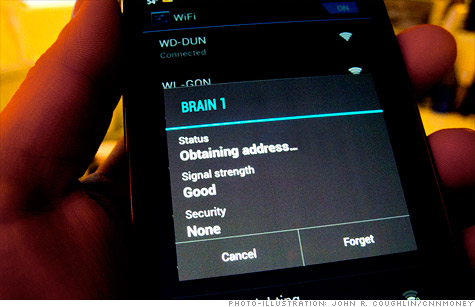Search News

NEW YORK (CNNMoney) -- Show off a new gadget to your friends or family and inevitably one person in the group will declare, "Soon they'll just plug these things directly into your brain!" And everyone will laugh, as if they've never heard that joke before.
It's no joke.
An Intel-commissioned white paper released Wednesday on the future of mobile technology concludes that connected devices interfacing with the human brain is an inevitability.
Here's how the paper's authors, from consultancy Booz Allen Hamilton, put it: "As convergence continues across device types, functions, and capabilities, the melding of mobile technologies directly into the human body becomes the logical next step."
They add: "By harnessing the processing power and capabilities of mobile devices, for example, our biological brain will be augmented exponentially by a digital counterpart."
Don't expect to plug your iPhone directly into your cranium in the next few years. There's a few remaining steps on the path toward turning us all into cyborgs.
First, "form factors" need to die. If you can do it on your computer at work, you should be able to do the exact same thing on your smartphone, or even your glasses.
Processor speeds need to continue rising, and computers need to improve their natural-language support so we can interact with our devices like we would with another human being. Also, security has to advance so that devices can recognize their owners, eliminating the need for passwords.
It sounds like far-off sci-fi stuff, but all of those evolutions are in the works today.
Microsoft (MSFT, Fortune 500) is starting to show progress on its vision of one converged operating system for all devices. IBM (IBM, Fortune 500) is making incredible strides in its Watson technology that can "understand" natural human language. Google's (GOOG, Fortune 500) latest Android phones can recognize their owners' faces to unlock their devices, and both Google and Microsoft are working on wearable computer displays.
So that's step one: a lag-free operating system that anyone can use intuitively to perform any computing task.
Step two: Interfacing with the body. These kinds of interfaces are already operating in a relatively rudimentary way, with implants and pacemakers. But in its paper, Intel suggests that the link-up will be much more robust.
How robust? Well, have you seen The Matrix?
"With thoughts able to be delivered seamlessly to the cloud and data projected in real time onto our vision ... our bodies and minds will become the devices with all of the associated benefits," the paper's authors write.
You'll literally be "plugged-in" to the cloud, so your brain will have access to all the information on the Internet. You'll never again forget a name or miss a meeting. You won't have to get a routine check-up from a doctor, either, since your gadgets will monitor your vital signs and test your blood for you.
Of course, for every wonderful benefit, there's an equally scary potential consequence.
Think about all the privacy issues we have today with sites like Facebook. Now imagine giving people the capability to record everything they see and hear and immediately post it to the Internet. The human race could turn into something like Star Trek's Borg, who can access the entire network and literally knew everyone's thoughts.
Plus, how would exam-taking work? If people begin to rely on their connectedness like a crutch, can it just be turned off or wiped out for security purposes?
We'd better be prepared to answer these questions, because Intel (INTC, Fortune 500) says it's coming soon, whether we like it or not.
"While the future is never certain, a future where humans are infused with mobile technology where we are part of the device, our own bodies and brains part of the technology, and where there are no barriers to pure capability, is becoming more believable by the day," Intel's paper concludes. ![]()